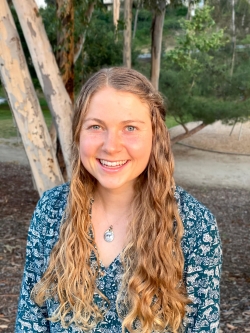Mary Tobin '20
portrait.jpg

Major: Engineering Sciences
Minor: Human Centered Design
Hometown: San Diego, CA
A passion for mechanical engineering and the outdoors made Dartmouth — with its strong engineering program and breathtaking, easily accessible natural environment — an ideal place for Mary Tobin '20 to pursue a college degree. It wasn't until her junior year when she participated in The Stretch, however, that she began to see how energy fit in to the work she wanted to do. The Stretch is a long-running, off-campus field experience offered by the Earth Sciences Department that takes students to field sites throughout the Western U.S., starting in Canada and ending at the Grand Canyon, to learn about geology and Earth's processes first hand. "One of the segments was looking at glaciers at Athabasca, right outside of Banff. What we were looking at was evidence of climate change reflected in the receding glaciers. It sparked my interest in how I could use my engineering knowledge to focus on climate change and reduce our carbon footprint."
Energy came into sharper focus for Mary through an internship during her junior winter. "I was working on a master-planning project for a company on how they could be carbon neutral by 2045. We were looking at alternative energy sources like wind, solar, fuel cells...looking at the ways the company could reduce its carbon profile but also looking at the ways the company could reduce its carbon profile while saving money spent on energy... It was really fascinating because I was learning about all these different energy sources and how they can reduce carbon, but also I was helping show that investing in these technologies can reduce costs in the long run."
One of Mary's favorite energy-related projects took the form of her participation in the ENGS 89/90 class. This two-term capstone course puts engineering students to work on design projects that are developed from specifications submitted by industry and other organizations, giving participants the opportunity to work on real-world engineering problems that result in tangible outcomes.
Mary's team focused on the College's heating system and was tasked with making recommendations about how best to proceed in creating a more sustainable campus energy system. "I loved working on this project not only because it was focused on the Dartmouth community, but we learned about the steam plant, district heating alternatives, geothermal, solar, and building reduction technologies. It gave me the chance to understand how the Dartmouth energy system affects professors, students, administrators, and local townspeople. There are many different stakeholders in the energy system, so there's not just one answer or opinion. Talking to as many people as possible was critical in forming a recommendation."
Mary was one of nine Dartmouth students awarded a Fulbright Scholarship this year. The grant will take her to Germany where, in addition to teaching English, she intends to connect with local engineers and learn more about the country's culture of sustainability. "The social aspect of change is very important; if you can't convince people that it matters to them, it doesn't matter what the science says." She hopes to learn more about how and why Germans typically have more readily adopted sustainable practices to in turn inform her own work on sustainable systems in the future.
Because of the pandemic, Mary has had to postpone her stint in Germany until 2021, but until then, she's keeping busy. She's already started work for a company (where she had previously interned), that designs science and technology, and biotech facilities, as a mechanical engineer focused on sustainability and energy.
These opportunities as well as her experiences working on real-world energy challenges, give Mary good reason to be optimistic about the future, even in the midst of the global crises of the coronavirus pandemic and climate change. "We can think creatively and critically and make smart investments in buildings, infrastructure, and renewables," she says. "And I'm hopeful that a lesson learned from COVID is that we're so interconnected, globally. I hope that the outcome will be international collaboration to combat our shared problems."